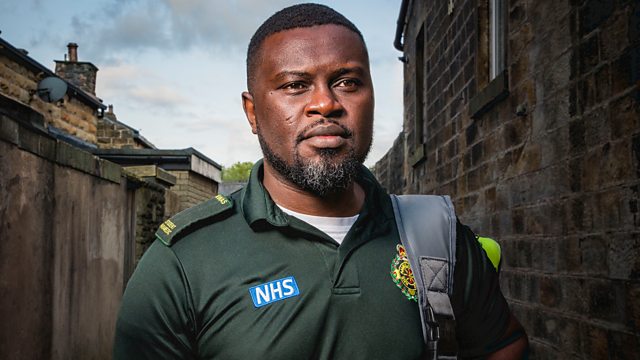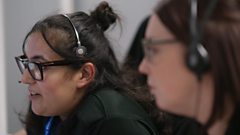While ambulances queue outside hospital with their patients, care is delayed for others ringing 999.
An hour into the night shift, and a new call is being received every 19 seconds. Call handler Sairah is in training and answering calls for the first time. She receives a call from a woman in distress, who reveals she has been assaulted by her boyfriend. As a result, police need to be dispatched on the fastest possible response.
Another call comes in, this time for a hit-and-run – a man has been knocked down by a moped that has driven off, and the patient has been left bleeding from the head. Due to the severity of the call, an ambulance and an advanced paramedic are immediately dispatched. The patient’s ear has been severed, so he is quickly taken to the nearest major trauma centre in the hope that it can be reattached surgically.
It’s 9am, and crew mates Asher and Jared are dispatched to a man who has fallen down the stairs after drinking too much. While they work on the tenderness in his spine, he opens up about why he is using drink to cope. It turns out he has been caring for his grandmother, who has a brain tumour.
In Blackpool, Isaac and Lauren are signing on for their new shift when they are dispatched to a patient who has activated a care alarm. Meanwhile, 1.5 miles away, a new 999 call is in progress. A 76-year-old woman with COPD is having difficulty breathing and chest pain. The decision is made to divert Isaac and Lauren, as this call is a higher priority, so the original caller must wait longer.
Back in Lancaster, Jared and Asher’s patient is on the ambulance. Asher reveals that her dad has been alcohol-dependent all of her life, but she thinks going through the hard times has made her empathise with patients. She likes being the person that can give people both help and hope.
It’s seven hours into the shift, and there is a worrying shortage of ambulances. Fifty-eight crews are waiting at hospitals to hand over their patients when a call comes in for a 76-year-old man struggling to breathe in Kendal. The closest ambulance has broken down, so dispatcher Graham needs to get the second closest resource to the patient - but they are 22 miles away. On arrival, Jared and Asher assess the patient. They worry that he is showing signs of sepsis and decide to urgently blue light him to the nearest emergency department at the Royal Lancaster Infirmary.
Lauren and Gerard are dispatched to a 16-year-old boy who has fallen off an electric scooter. He is given gas and air to manage his pain in his arm and knee, but due to the hospital being so busy, he and his mum are told they will need to wait in the back of the ambulance until the other patients are seen.
Meanwhile, Asher and Jared arrive at hospital with their patient with suspected sepsis. Due to his potentially life-threatening condition, he is taken straight into A&E. Unfortunately, the other crews there are still experiencing handover delays of up to 41 minutes, and across the region, the number of ambulances now stuck waiting outside hospitals has risen to 70.
Call handler Sairah is on her final shift of the week and is nearing the end of her training. Sairah admits to Jenna, who is mentoring her, that she is dreading any calls to do with childbirth, poorly children or cardiac arrests. Before long, she answers the phone to the mum of a two-year-old child who has drunk shampoo and is now struggling to breathe. When the call ends, the emotion gets all too much for Sairah.
Asher and Jared receive a call for a one-year-old child having a suspected allergic reaction. After an initial panic trying to locate the child, Asher and Jared spot the mum and baby. The boy has had allergic reactions in the past, so the crew take mum and baby to hospital. Back in the truck, Asher reveals that she called an ambulance for her daughter when she was younger – and this has brought it all flooding back.
This episode highlights the acute challenges faced by the ambulance service when delays at hospital mean that they’re not available to treat patients. Despite the rising challenge, the crews, call handlers and dispatchers always try to keep a smile on their faces, while using their personal experience and empathy to ensure their patients feel they are receiving the best care available, in difficult circumstances.
Last on
More episodes
Previous
Next
You are at the last episode
Clip
-
![]()
"You did really, really well"
Duration: 02:33
Credits
| Role | Contributor |
|---|---|
| Narrator | Christopher Eccleston |
| Executive Producer | Simon Ford |
| Executive Producer | Peter Wallis-Tayler |
| Series Producer | Tasha McLintock |
| Series Editor | James Robinson |
| Director | Dan Nightingale |
| Production Company | Dragonfly Film and Television |
Broadcasts
- Wed 20 Mar 2024 21:00���˿��� One except Nightlight
- Thu 28 Mar 2024 00:20���˿��� One except Northern Ireland, Northern Ireland HD, Scotland, Scotland HD & Nightlight
- Thu 28 Mar 2024 00:50���˿��� One Northern Ireland & Northern Ireland HD only
- Thu 15 Aug 2024 00:05


